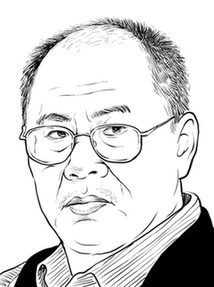China should avoid traps of universalism
- By Han Zhu
 0 Comment(s)
0 Comment(s) Print
Print E-mail China.org.cn, June 28, 2012
E-mail China.org.cn, June 28, 2012
|
|
|
Han Zhu, a research fellow of the Sinolizing Research Center. |
Since the inception of market reform in the 1990s, two new schools of thought have gradually taken form in China's intellectual and media circles: Chinese Liberalism and New Leftism. The former claims that the reform in China is a halfway reform, and that Deng Xiaoping's theory, which stresses the importance of strengthening both the spiritual strength of society and its material growth through socialist principles, has badly hampered the development of Chinese society. Proponents of Chinese Liberalism believe that economic reform can only breed crony capitalism if the Western democratic system is not adopted.
New Leftists, however, believe that reform in China is essentially one step away from the socialist model. They believe that today's social problems are all rooted in the excesses of capitalism.
But in essence, these two seemingly opposite ideas both believe in the existence of a universally applicable model. But due to their fundamentalist undertones, both camps have gradually become alienated from both the government. In essence, their disputes are rooted more in philosophy than in policy.
China's market-oriented reform should have promoted a political alliance between the government and the Liberals against the New Leftists, who strongly oppose a market-driven economy. Likewise, the New Leftists should have supported the communist government in order to strengthen socialism.
Despite their differences, both Chinese Liberalism and New Leftism have their ideological roots in left-wing culture, which led to the formation of solid political movements during the first half of the 20th century. Neither, then, has any direct philosophy relation to their Western namesakes. Based on rationalism, both camps believe that one can appeal to reason in order to create an ideal social model which is of universal value. The only difference is that the Liberals think that the ideal model has already been established by developed countries, and China's reform should merely replicate Western development patterns; by contrast, the New Leftists claim that Marxism has already presented a universally applicable social model to the world and China should therefore return to the universal values of communism.
Western academia has long been aware of the dangers of rationalism and universalism. The British philosopher Bertrand Russell once criticized rationalism for serving as the philosophical underpinning of political despotism. Chinese academia also criticizes the despotism of ancient China and the modern Western world, but rarely rethinks the thoughts and social cultural traditions in modern China from a philosophical perspective. Although claiming to be disciples of Friedrich Hayek and Milton Friedman, Chinese Liberals essentially adopt the same thought patterns as the New Leftists rather than those of classical Western liberals. Both camps are, by nature, students of Stalinism and Zhdanovism and are the unconscious prisoners of universalism and fundamentalism.
Essentially, the conflict between Liberalism and New Leftism in modern China is an internal battle for leadership between two branches of universalism. Likewise, the conflict between the Chinese government and the two theoretical camps is in nature a conflict between empiricism and rationalism; a battle between realism and fundamentalism.
During reform and opening up, Chinese academia appeared to fall behind political, business and labor circles with regard to innovative thinking. The fact of this lag has nothing to do with intellectual ability. As the de facto practitioners of China's reform, businesses must adhere to realism and empiricism and break the shackles of fundamentalism. On the other hand, Chinese intellectuals are so obsessed with the establishment of a conceptualized ideal society that they fall prey to the traps of fundamentalism. More than thirty years after the inception of economic reforms, the two branches of fundamentalism still pose a big threat to China's reform and national rejuvenation.
(This post was first published in Chinese and translated by Li Xiao.)
Opinion articles reflect the views of their authors, not necessarily those of China.org.cn.






